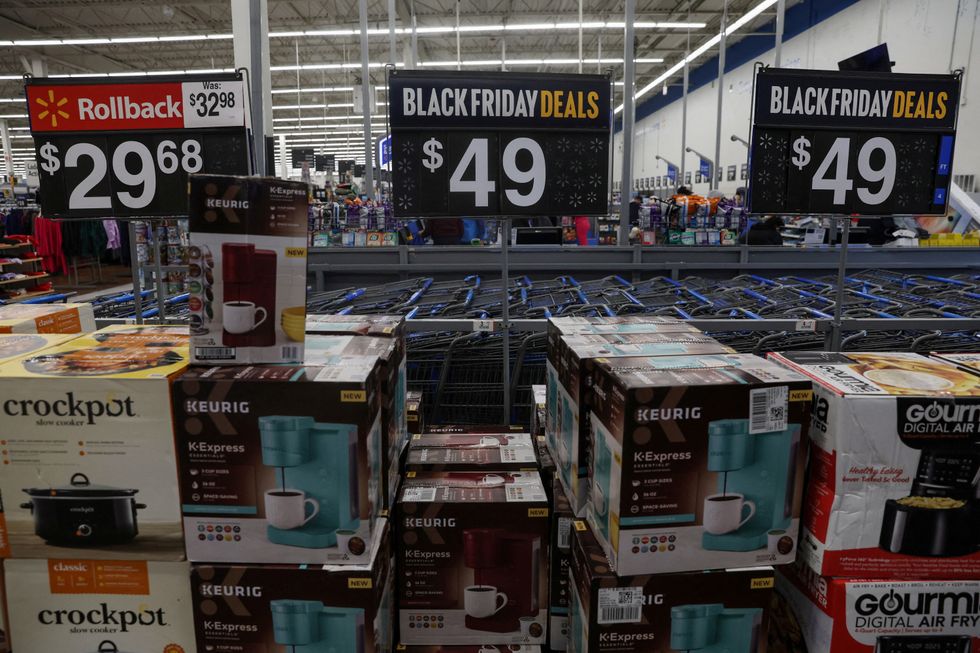Looking for the best Black Friday deals? With thousands of retailers taking part in the blockbuster sales event — and millions of products discounted on shelves worldwide — there’s a lot of price cuts to digest.
Unsurprisingly, not every one of these Black Friday deals is worth your time. In fact, consumer group Which? did a deep-dive into the Black Friday sale from 2022, and found that 98% of discounts were not at their lowest-ever price.
With just 2% of products and subscription services at a record-low price, you need to be really careful when adding anything to your shopping basket. But there are genuine discounts out there — if you know where to look.
Whether you’re looking to stock-up on Christmas presents, reduce your monthly expenditure on broadband and phone bills, or simply want to treat yourself to something new – Black Friday can be a great time to buy.
We’ve done the hard graft for you, sorting through thousands of Black Friday deals to find the ultimate savings. Scroll down for our pick of the 19 Black Friday deals that are genuinely worth your time.
19 Best Black Friday Deals
With a dizzying number of deals available, it can be tough to find the genuine discounts. Whether you’re looking to treat yourself to a new gadget, cut your monthly phone and broadband bills, or stock-up on Christmas presents without paying full price for anything …we’ve rounded up the Black Friday deals you can’t afford to miss. Unless stated otherwise, the price cuts below all end at 11.59pm on December 2nd.
1. Read millions of Kindle books and magazines for under £1
This is a very easy recommendation — because it’s only 99p. Yes, for a limited time, Amazon is offering 3 months of Kindle Unlimited, which is like Netflix for books, for under £1. Cancel anytime during the trial and you’ll pay just 99p …but be able to download and read thousands of bestsellers, non-fiction, travel guides, recipe books, and much more across all of your devices
Kindle Unlimited
10. Save £600 on autonomous Roomba j9+ Robot Vacuum and Mop
This top-of-the-line Roomba robot vacuum cleaner and mop from US brand iRobot offers a powerful hands-free clean throughout your home. The diddy droid is equipped with Dirt Detective functionality, which intelligently prioritises the messiest rooms first. The charging base has a reservoir for clean and dirty water, as well as a dust bin that only needs to be emptied every 60 days — so you won’t need to worry about this self-steering robot, while it cleans your home on-demand or on a regular schedule, for weeks on end
Roomba j9+
11. Kärcher window vacuum drops to record-low price on Amazon
The premium Kärcher WV 1 handheld window vacuum cleaner is designed to clean windows, mirrors, shower screens, ceramic hobs, and tiles without leaving a streak behind. The rechargeable battery has enough juice for up to 25-minutes of cleaning. Kärcher has included an LED screen to indicate the remaining runtime. Dirty water is collected in a 100ml tank, which can be poured away contact-free. While the Kärcher WV 1 has been included in Amazon sales before, the latest 24% discount is an all-time record
Kärcher WV 1
15. Get paid £20 by Uber when you book a flight this Black Friday
Uber already lets you book taxis, train tickets, and order takeaway meals… and now you can book flights from its one-stop-shop app too. To incentivise anyone looking to book bargain flights this Black Friday, Uber is offering £20 in credit per passenger for every flight you book within its Android or iPhone app. That £20 credit can be spent on a taxi ride from the airport on arrival, train tickets, another flight, or takeaway tonight. This deal is only available in the mobile app
Uber
What Is Black Friday?
Black Friday is an international shopping phenomenon, with thousands of retailers taking part every year in a bid to drum up extra sales ahead of the holidays.
Its origins can be traced back to the United States — and in brick-and-mortar stores, where millions would queue outside ahead of opening to get their hands on so-called “doorbuster” deals that were only available on a single day after the Thanksgiving celebrations.
Black Friday is believed to have started in the mid-20th century, although an exact date is not known.
In fact, the mystery continues, with even the origins of the term “Black Friday” disputed. Many incorrectly believe the name derives from the idea that businesses use the extra revenue from the sales to move from losing money (being “in the red”) to turning a profit (or being “in the black”), but this is untrue.
Most historians agree “Black Friday” originated in the 1960s Philadelphia police department. The story goes that the day after Thanksgiving, the city streets would be so congested with shoppers and tourists that police officers had to work extra-long shifts, referring to the day as “Black Friday” due to the chaos it unleashed.

Black Friday deals are advertised inside a Walmart department store in Westbury, New York. The Black Friday sales — now a global shopping phenomenon — originated in the United States, where it follows the Thanksgiving public holiday
REUTERS
What about in the UK? British bargain-hunters were first introduced to the Black Friday phenomenon until 2010, when Amazon decided to import the sales event — already a massive success for its online business in its native United States.
Feverish interest caused Amazon UK to struggle with demand, with discounted products selling out in minutes and the website struggling to stay online due to the vast number of visitors.
That colossal level of interest from British shoppers sealed the fate of Black Friday in the UK.
In 2015, Argos’ website when offline due to a colossal number of bargain-hunters trying to check the website at 00.01am on Black Friday. The store wouldn’t reveal any of its deals ahead of time, teasing its Black Friday event and setting everything live simultaneously as the clock struck midnight on the day.
The rise of online shopping not only brought Black Friday to UK shores, and many other countries around the world, but it’s also added a sister sale to the calendar. With virtual shopping baskets replacing physical ones, Cyber Monday was kickstarted by online retailers as a digital-only sale that followed Black Friday.
Originally intended as a distinct sale, with Black Friday specialising in its “doorbuster” deals, while Cyber Monday catered to those who wanted to shop on their phone, tablet or computer from the comfort of their own home …over time, the two sales have merged.
Most Black Friday discounts now run from Friday, throughout the weekend, and until the end of Cyber Monday. And to avoid the sudden influx of demand that brought Argos’ website crashing down at midnight almost a decade ago, retailer now regularly extend their Black Friday sales across a two-week period — or longer.
In other words, if you’re looking for discounts, you can now shop online or in-person, at almost any point in the final two weeks of November and be sure to get your hands on the Black Friday deal.
When Is Black Friday?
Black Friday always falls in the fourth week of November — and the first friday after the Thanksgiving public holiday in the United States of America, where the sale originated. This time around, Black Friday will fall on November 29, 2024. Here’s a breakdown of the recent Black Friday dates:
- Friday November 29, 2024
- Friday November 24, 2023
- Friday November 25, 2022
- Friday November 26, 2021
- Friday November 27, 2020
- Friday November 29, 2019
- Friday November 23, 2018
- Friday November 24, 2017
When Do Black Friday Deals End?
Unfortunately, there’s no exact date and time when all Black Friday discounts come to an end. It’s down to individual retailers to determine when they pull the plug on their Black Friday deals.
As mentioned above, most retailers have decided to merge Black Friday and so-called Cyber Monday into a single four-day sales event. For example, Apple will offer its annual Black Friday deal — which it calls The Apple Store Shopping Event — from 00.01am on Black Friday (November 29) until 11.59pm on Cyber Monday (December 2), so that it covers all bases. Other retailers, like Amazon, kickstarted Black Friday much earlier, with its discounts taking place across an entire week.
Never assume that your chosen discount will stick around until 11.59pm on Monday December 2 …as you could be left bitterly disappointed. If you’re not able to see an end date in the small print on the retailers’ website, it’s better to add the discounted product to your basket as soon as possible to avoid disappointment.
Even if a certain discount is scheduled to stick around until the end of the month, it could vanish early if the retailer runs out of stock. That’s something we’ve seen in the past when covering Black Friday sales, so it’s definitely something to watch out for.

Martin Lewis — one of the UK’s most searched-for British men, and also one of the most trusted — has some easy-to-remember advice about the Black Friday sales
PRESS ASSOCIATION
What Is Martin Lewis’ Advice On Black Friday?
Martin Lewis has some very simple advice for those browsing the Black Friday sales.
Each year, the founder of MoneySavingExpert likes to remind shoppers that: “If you were going to buy it anyway and it’s half price, you’ve saved 50%.
“If you weren’t going to buy it, but do because it’s half price you’ve wasted 100%.”
The broadcaster regularly reminds viewers of this rule of thumb during his Money Show Live on ITV. The telly host has also previously shared the advice on X, formerly Twitter, which you can read below.
My Black Friday shopping memo…
If you were going to buy it anyway and it’s half price, you’ve saved 50%.
If you weren’t going to buy it, but do because it’s half price you’ve wasted 100%.
— Martin Lewis (@MartinSLewis) November 14, 2022
One bulletproof way of making sure you stick to Martin Lewis’ rule is to write a list of the products you’re looking to buy in the Black Friday sale before you load-up a website or head to a high street store. No matter what deals you spot, stick with only the items on the list and you’re sure to avoid overspending.
Black Friday Scams, And How To Avoid Them
With the increased shopping activity around Black Friday, it’s perhaps no surprise that cybercriminals also use the sales event to double-down on their scams.
Barclays has issued an urgent warning as its research revealed a 22% increase in money lost due to scams throughout the Black Friday and Cyber Monday sales last year. Barclays’ data shows that shoppers lost an average of £970 on purchases that never arrived or weren’t as advertised.
Speaking about the research, Dr Peter Brooks, Chief Behavioural Scientist at Barclays, said: “People act differently under pressure, and scammers will take advantage of the way shoppers behave during Black Friday sales. Sales are typically all about speed, and scammers will play on people’s emotions to instil a sense of time pressure or create a perceived scarcity for an item.
“They will also bank on people not doing the appropriate due diligence before making a purchase, and getting swept up in the rush and excitement of Black Friday. Never feel pressured into making a purchase, and if something doesn’t feel right, take a step back and ask someone you trust – a family member, friend, or your bank – for advice.”
To help you enjoy the Black Friday sales without the risk of losing any money, we’ve put together some useful tips to make sure you avoid the most common scams.
1. Avoid Suspicious Links
These could be links sent in an email, text message, or online advert – if it doesn’t seem legitimate, don’t click it.
If you want to check the legitimacy of a text or email, clicking on the contact information of the sender can be useful. If the email address or phone number doesn’t seem to match up with that of the company they’re associating themselves with, it’s likely fake.
2. Steer Clear Of Browser Extensions
During the busiest sales periods, you’ll start to see a slew of “money-saving” browser extensions advertising themselves as a way to unlock the best discounts. Some of these browser extensions are legitimate, but others have been developed by scammers as a way of phishing data.
Most legitimate Black Friday discounts can be found direct on the retailers’ website, with no need for standalone software installed in your web browser. If you do opt to install extensions, make sure to do your research – inputting the name of the extension in sites like TrustPilot to determine whether it’s a legitimate source of buying advice.
3. Beware Bogus Gift Cards and Vouchers
Be wary of unsolicited emails or posts on social media offering incredible Black Friday deals via gift cards or vouchers. Scammers promise massive discounts not available anywhere else in exchange for personal information or payment.
But these too-good-to-be-true discounts are usually scams to siphon your personal data or payment information. Instead, stick with well-known retailers and their official channels for any gift card purchases. And be wary of tweets or Facebook posts advertising deals that seem suspiciously generous.
4. Watch Out For Unfamiliar Websites
It’s easy to get lost in the excitement of the Black Friday bargain-a-thon, but it’s always important to check where you’re ordering from.
Scammers have been known to host fake websites to sell products for an “amazing” price, when in fact they are using the opportunity to retrieve your data and bank details. These are often designed to mimic legitimate websites.
Always check the URL in the address bar of your web browser to see whether it seems legitimate.
5. Swerve Deals That Seem Too Good To Be True
Some scammers create enticing deals that seem too good to pass up. These can include counterfeit products, nonexistent items, or hidden fees. To avoid falling for these scams, research prices beforehand, be sceptical of deals that seem unrealistically low, and only shop from reputable retailers.
6. Be Wary Of Verification Code Scams
This is a type of scam designed to break the two-factor authentication used to secure your online accounts. Scammers will post as your bank or a company you’ve recently made a purchase from, claiming that you need to confirm the unique verification code to finalise a purchase.
Hackers who employ this technique will already have your username and password, but will be unable to login to the account without the unique six-digit code sent to your mobile number to verify your identity.
If you send that code to them, they’ll be able to access more of your data and potentially lock you out of your online account.




